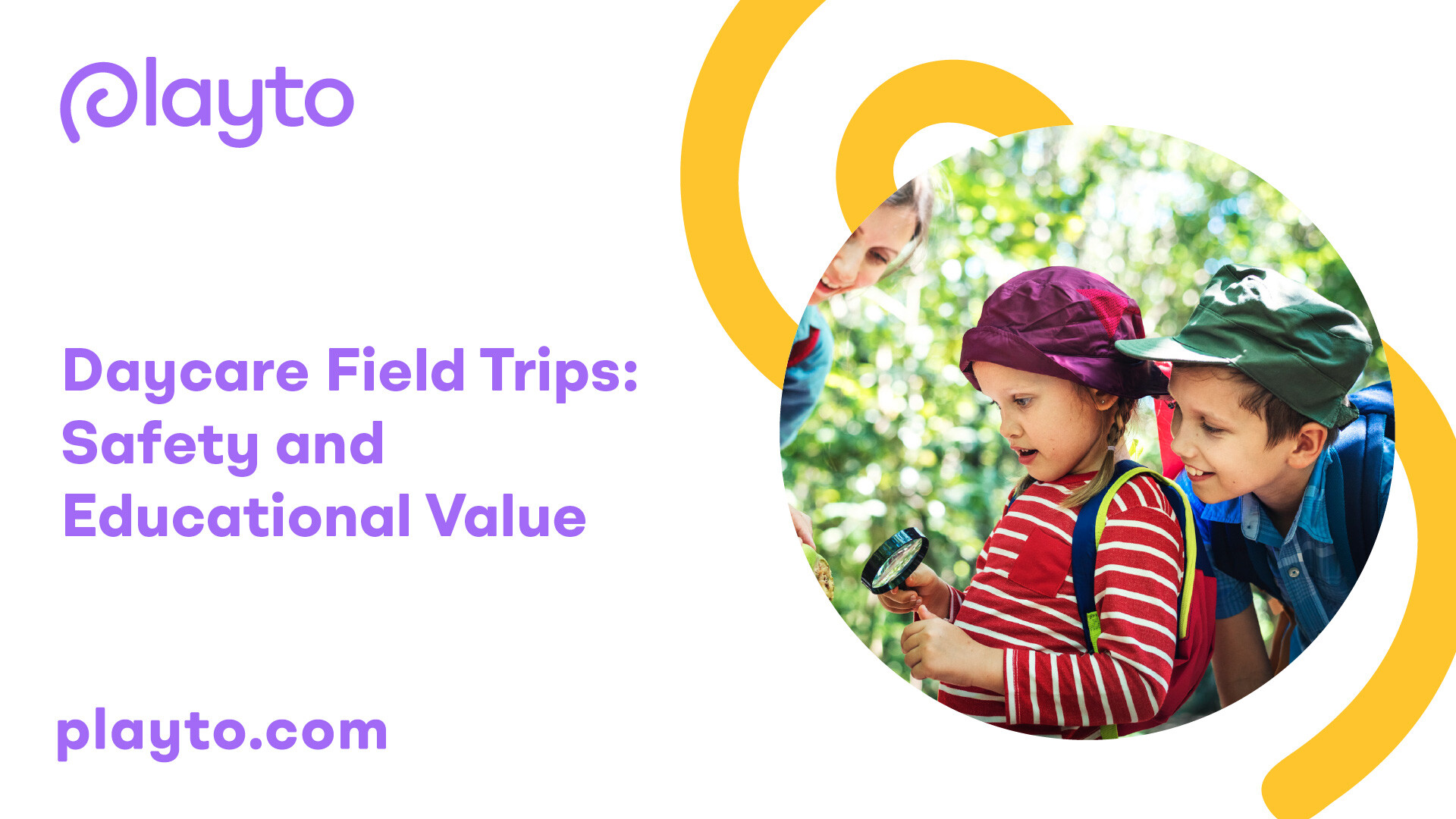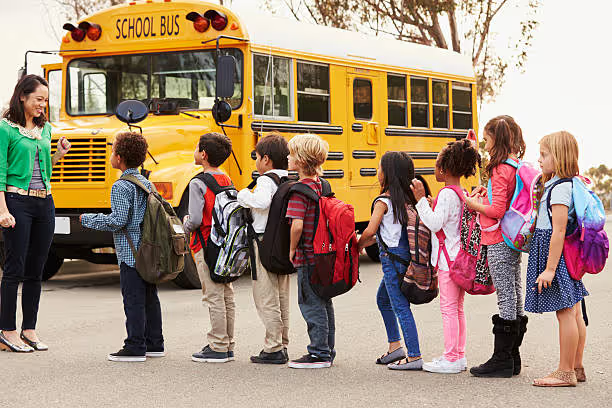Benefits of Field Trips for Daycares
Field trips offer numerous benefits for daycares, providing both educational value and fostering social development among children.

Educational Value
Field trips provide students with real-world experiences that enhance their understanding of classroom topics. These experiential learning opportunities outside the classroom have been shown to improve academic performance. By stepping outside the confines of the daycare facility, children have the chance to engage with their surroundings, observe new environments, and apply what they have learned in a practical context.
Field trips offer unique learning experiences that cannot be replicated in a traditional classroom setting [3]. Whether it's exploring a local museum, visiting a farm, or going on a nature walk, children can encounter hands-on learning opportunities that stimulate their curiosity and make learning more engaging.
Social Development
Interacting with peers in a new environment during field trips fosters teamwork and communication skills. Collaborative activities and shared experiences promote cooperation and help children develop essential social skills that are crucial for their future interactions.
Field trips also encourage social interaction and help children develop empathy and cultural awareness. By exposing children to diverse environments, cultures, and people, field trips broaden their perspectives and promote an understanding and appreciation of different ways of life.
By incorporating field trips into daycare programs, educators can enhance the educational journey of children and provide them with valuable opportunities for growth and development. The combination of educational value and social development makes field trips a valuable component of daycare curricula.
Remember to check with your daycare's policies on field trip permissions and guidelines to ensure the safety and well-being of the children. Additionally, qualified and trained daycare staff play a crucial role in supervising and facilitating these enriching experiences.
Safety Measures for Daycare Field Trips
When it comes to daycare field trips, safety is of utmost importance. Effective planning, preparation, and staff training are essential to ensure the well-being of children during these outings. [2]

Planning and Preparation
Thorough planning and preparation are crucial for ensuring the safety of children on field trips. This process involves several key steps:
- Risk assessments: Conducting thorough risk assessments helps identify potential hazards and develop strategies to mitigate them. Factors such as transportation, activities, and the destination itself should be carefully evaluated [8].
- Emergency procedures: Establishing clear and comprehensive emergency procedures is vital. This includes protocols for handling accidents, injuries, and other unexpected situations. All staff members should be familiar with these procedures and know how to respond effectively.
- Communication protocols: Establishing effective communication protocols is essential for keeping everyone informed and connected during the field trip. This includes maintaining contact with parents or guardians, as well as ensuring that staff members can communicate with each other at all times.
Staff Training
Well-trained staff members play a crucial role in managing emergencies and ensuring the well-being of children during field trips. Adequate training equips staff with the necessary skills and knowledge to handle various situations. Key areas of training should include:
- First aid: Staff members should receive training in basic first aid to be able to provide immediate assistance in case of injuries or medical emergencies. This includes knowledge of CPR, wound care, and recognizing signs of distress or illness.
- Behavior management: Training in behavior management techniques helps staff members effectively address any behavioral challenges that may arise during field trips. This includes strategies for maintaining discipline and promoting positive behavior.
By prioritizing planning, preparation, and staff training, daycares can ensure that field trips are safe and enjoyable experiences for children. These measures help minimize risks and ensure that the well-being of children remains a top priority throughout the entire outing. [3]
Choosing Suitable Destinations
When planning field trips for daycares, it is essential to select suitable destinations that provide both educational value and a safe environment for children. Two primary categories of destinations to consider are local options and educational institutions.

Local Options
Local field trips offer numerous benefits for daycare children. They provide hands-on learning experiences that connect classroom content to the real world, fostering a deeper understanding of the community and the environment. Exploring nearby parks, museums, libraries, or community centers can spark curiosity and engage children in interactive learning activities. Furthermore, opting for local destinations can be more cost-effective for daycares, allowing for more frequent educational outings.
Consider the following local options for daycare field trips:
Destination Description
- Local Parks: Children can learn about nature, biodiversity, and engage in outdoor activities.
- Museums: Interactive exhibits can introduce children to art, history, science, and culture.
- Libraries: Storytelling sessions, book readings, and educational programs can promote literacy.
- Community Centers: Workshops, events, and programs can teach children about community engagement and social responsibility.
Educational Institutions
Visiting educational institutions can have a significant impact on daycare children, inspiring them to pursue higher education in the future. Universities, colleges, and vocational schools often offer guided tours tailored to different age groups, enhancing the learning experience. These visits can expose children to a variety of academic disciplines and provide insights into campus life.
Consider the following educational institutions for daycare field trips:
Institution Description
- Universities: Tours can introduce children to a higher education environment and inspire academic aspirations.
- Colleges: Smaller, community-focused colleges can provide a glimpse into different educational paths.
- Vocational Schools: Children can learn about specialized skills and potential career paths through hands-on demonstrations.
By carefully selecting destinations that align with educational objectives and safety considerations, daycare providers can create enriching field trip experiences for children. Remember to review and follow daycare policies on field trip permissions, ensuring that proper consent is obtained from parents or guardians.
Transportation Considerations
Safety Regulations
When it comes to daycare field trips, transportation safety should be a top priority. Following safety regulations ensures the well-being and security of the children during travel. Several organizations provide guidelines for safe transportation in the context of daycare field trips. Some notable resources include:
- "Ensuring Safe School Travel: Responsibilities and Liabilities" from the National Association for Pupil Transportation.
- "Guidelines for School Bus Safety Inspections" from the National Highway Traffic Safety Administration.
- "Transportation Safety in Child Care" from the American Academy of Pediatrics.
These resources outline important regulations and best practices to ensure a safe and secure journey for children. Daycare providers should familiarize themselves with these guidelines and implement appropriate safety measures to comply with the regulations. By adhering to these standards, daycare centers can create a safe transportation environment for their field trips.
Vehicle Maintenance
Proper vehicle maintenance is crucial for safe transportation during daycare field trips. Regular maintenance checks help identify and address any potential issues that could compromise the safety of the children. To maintain a well-maintained fleet, daycare providers should consider the following resources:
- "School Bus Maintenance Program" provided by the National Association for Pupil Transportation.
- "Vehicle Maintenance Guidelines for Child Care Providers" provided by the National Resource Center for Health and Safety in Child Care and Early Education.
These resources offer valuable insights and recommendations for maintaining vehicles used for daycare transportation. Regular inspections, repairs, and adherence to maintenance schedules are essential to minimize the risk of mechanical failures and ensure the safety of the children.
By following safety regulations and prioritizing vehicle maintenance, daycare providers can uphold a high standard of safety during field trips. Ensuring compliance with regulations and maintaining well-maintained vehicles sets the foundation for a secure and worry-free transportation experience for both children and caregivers.
Parental Involvement
When it comes to daycare field trips, parental involvement is crucial for ensuring the safety and success of the outings. Two key aspects of parental involvement are obtaining permission through consent forms and establishing effective communication channels with parents.
Permission Forms
Before taking children on a field trip, daycares must obtain permission from parents or guardians. Clear and detailed permission forms are essential to ensure that parents are well-informed about the trip and its associated risks. These forms typically include information such as the date, destination, duration, transportation details, and emergency contact information.
According to research by Smith (2018), having clear and detailed permission forms for daycare field trips is of utmost importance. These forms should clearly outline the purpose of the trip, any potential hazards, and the measures taken to ensure the safety of the children. By providing comprehensive information, parents can make informed decisions about granting permission for their child to participate.
To streamline the process, daycares should establish consistent policies and procedures for handling permission forms. This includes setting deadlines for submission, ensuring forms are properly filled out, and keeping a record of received permissions. For more information on daycare policies regarding field trip permissions, refer to our article on daycare policies on field trip permissions.
Communication Channels
Establishing effective communication channels between daycares and parents is essential before, during, and after field trips. Open and transparent communication helps build trust and allows parents to stay informed about the details and progress of the outing.
To facilitate communication, daycares should utilize various channels such as email, phone calls, newsletters, and parent-teacher meetings. Brown (2017) suggests that maintaining regular and proactive communication can help address any concerns or questions parents may have, ensuring a smooth and positive field trip experience.
In today's digital age, technology can also play a significant role in improving daycare-parent communication during field trips. Garcia (2020) highlights the importance of utilizing technology such as mobile apps or online platforms to provide real-time updates, share photos, and address any concerns. These tools can enhance parental engagement and provide reassurance about their child's well-being.
By establishing clear communication channels, daycares can keep parents informed and involved in their child's field trip experience. This open line of communication allows for any necessary coordination, provides updates on the trip's progress, and addresses any concerns promptly.
In conclusion, parental involvement through permission forms and effective communication channels is vital for successful and safe daycare field trips. By obtaining permission through well-designed consent forms and maintaining open communication, daycares can ensure that parents are well-informed and actively engaged in their child's field trip experience.
For more information on related topics, you can refer to our articles on building relationships with daycare staff, daycare discipline policies: what to expect, daycare staff qualifications and training and daycare policies on field trip permissions.
Enhancing Learning Through Field Trips
Field trips provide valuable opportunities for children in daycare to enhance their learning experiences beyond the classroom. To maximize the educational value of these excursions, incorporating pre-trip activities and post-trip reflection is key.
Pre-Trip Activities
Engaging children in pre-trip activities is an effective way to prepare them for the upcoming excursion. Research studies have shown that pre-trip activities have a positive impact on student learning outcomes. These activities can include:
- Researching the destination: Encourage children to learn about the place they will be visiting. This can involve reading books, watching videos, or exploring websites related to the destination.
- Group discussions: Facilitate conversations about the purpose of the field trip and what children hope to learn or experience. Encourage them to ask questions and share their thoughts and expectations.
- Preparing questions: Encourage children to come up with questions they would like to ask during the field trip. This helps to stimulate curiosity and active engagement during the visit.
By engaging children in pre-trip activities, you can create a sense of anticipation and build their background knowledge, enhancing their overall experience during the field trip.
Post-Trip Reflection
Post-trip reflection is just as important as pre-trip activities in the learning process. It allows children to reflect on their experiences, solidify their understanding, and make connections between what they learned during the field trip and their prior knowledge. Research studies have highlighted the importance of post-trip reflection in improving learning outcomes.
Here are some ways to facilitate post-trip reflection:
- Group discussions: Provide a platform for children to share their experiences, thoughts, and feelings about the field trip. Encourage them to discuss what they learned, their favorite parts, and any surprises they encountered.
- Journaling or drawing: Invite children to document their experiences through writing or drawing. This allows them to express their thoughts and observations in a personal and creative way.
- Follow-up activities: Engage children in follow-up activities related to the field trip. This could include creating artwork inspired by the trip, conducting further research on a specific topic of interest, or presenting their experiences to their peers.
By incorporating post-trip reflection, children have the opportunity to deepen their understanding, reinforce the knowledge gained, and develop critical thinking skills.
By integrating pre-trip activities and post-trip reflection into daycare field trips, educators can enhance the educational value of these experiences. These practices promote active engagement, encourage curiosity, and foster a deeper connection between classroom learning and real-world experiences.
